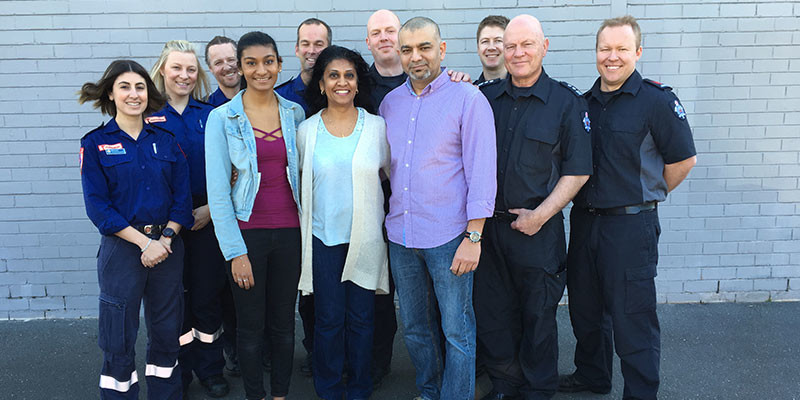Oakleigh South mother meets paramedics and firefighters who came to her aid after cardiac arrest
August 17, 2016in Community News
An Oakleigh South mother who suffered a cardiac arrest at home has been reunited with the Ambulance Victoria paramedics and Metropolitan Fire Brigade (MFB) firefighters who helped her.

Anna D’Rosario had booked an overseas holiday to celebrate her 50th birthday, the same night she had her cardiac arrest in February.
“My husband Nick went to bed, and I fell asleep not long after he did,” Anna, 50, said.
“Nick then woke up to what he thought was me snoring but after he shook me to try and wake me up and was calling my name and I wasn’t responding he knew something was wrong,” she said.
Nick said a loud noise woke him.
“Looking back on it now, I think the noise I heard was Anna trying to breathe,” Nick said.
“Once I turned the light on I saw that Anna’s lips were blue so I immediately started chest compressions.”
The couple’s teenage daughter Jaleesha called Triple Zero (000), while Nick quickly initiated effective cardiopulmonary resuscitation (CPR) in the bedroom.
Paramedics Michaela Free, Aleksandra Lisowska, Ross Pollard and Simon Pearce could not be more thankful to the patient’s husband who came to her aid, saying his quick thinking and effective CPR contributed to the great outcome.
“When Aleksandra and I arrived and walked into the bedroom, Nick was performing fantastic compressions on Anna,” Michaela said.
“Early CPR does save lives, and Nick was doing a great job given the circumstances.”
Ambulance Victoria General Manager Clinical and Community Services Ian Patrick said in a cardiac arrest early CPR was critical in improving outcomes.
“What you do before emergency services arrive can greatly improve the chances of someone’s survival – any attempt at CPR is better than none,” Mr Patrick said.
The paramedics were also very grateful for the work of the MFB firefighters, who also responded to Anna’s case as part of the Emergency Medical Response (EMR) program.
The EMR program was established in 2000 and aims to improve cardiac arrest survival rates through the rapid provision of early effective CPR and defibrillation from trained first responders.
When a priority zero medical emergency occurs, the nearest ambulance and MFB fire truck are dispatched.
Firefighters are trained to provide unconscious, non-breathing and pulseless patients with Basic Life Support care until an ambulance arrives.
In Anna’s case, MFB firefighters arrived soon after paramedics and moved her from her bedroom to the lounge room and continued CPR under the direction of paramedics. Paramedics then attached a defibrillator and shocked Anna once before she regained a heartbeat.
A defibrillator is used to analyse a person’s heart rhythm and shock a person’s heart back into normal function, if they are in cardiac arrest.
Mr Patrick said the EMR program was designed to strengthen the ‘chain of survival’, which contributed to improving cardiac arrest survival.
“The six steps in the ‘chain of survival’ are early recognition of cardiac arrest, early access to emergency care (calling Triple Zero), early CPR, early defibrillation, early advanced care (paramedics) and definitive care (hospital),” Mr Patrick said.
MFB Chief Executive Officer Jim Higgins said, despite the EMR program being almost two decades old, there are still instances where members of the public are unaware of the assistance firefighters can provide.
“Last year MFB firefighters attended almost 5000 emergency medical response calls right across Melbourne,” Mr Higgins said.
“If you call Triple Zero for assistance listen carefully to the call taker who can provide instructions for first aid and CPR. If a fire truck arrives first, don’t turn them away. They are there to help save lives.”
Anna had an implantable defibrillator and pacemaker inserted and spent two weeks in hospital and a further two weeks in a rehabilitation facility.
“It was wonderful to meet all those who helped me – I think the paramedics and firefighters each provide an amazing service and I don’t think people recognise them enough,” Anna said.
“I think it was great for me to be able to thank them all but for me, it doesn’t seem enough to just thank them.”
Nick also said it was fantastic to meet the paramedics and firefighters who came to his wife’s aid.
“If it wasn’t for them, Anna wouldn’t be alive today,” Nick said.
Further Information
Learn more about Emergency Medical Response.
